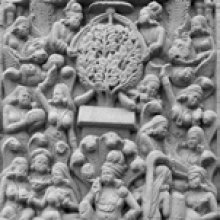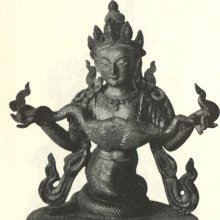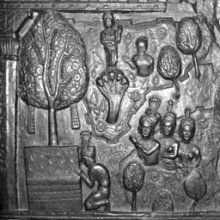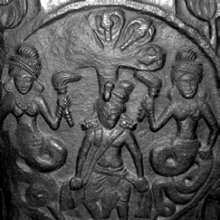Nagin, Nāgī, Nāgin, Nagi: 17 definitions
Introduction:
Nagin means something in Buddhism, Pali, Hinduism, Sanskrit, the history of ancient India, Jainism, Prakrit, Hindi, biology. If you want to know the exact meaning, history, etymology or English translation of this term then check out the descriptions on this page. Add your comment or reference to a book if you want to contribute to this summary article.
Images (photo gallery)
In Hinduism
Ayurveda (science of life)
Toxicology (Study and Treatment of poison)
Source: Shodhganga: Kasyapa Samhita—Text on Visha ChikitsaNāgī (नागी) refers to an herbal ingredient which is included in a (snake) poison antidote recipe, according to the Kāśyapa Saṃhitā: an ancient Sanskrit text from the Pāñcarātra tradition dealing with both Tantra and Viṣacikitsā—an important topic from Āyurveda which deals with the study of Toxicology (Viṣavidyā or Sarpavidyā).—Kāśyapa prescribes various antidotes to quell the poison by administering them through nasal drugs, collyrium, ointment, herbal drinks and diet. According to Kāśyapasaṃhitā (verse VIII.99)—“A paste of Iśvarā [Īśvarī], Kadalī, Nāgī, Candana, Ghanasvinī and Nirguṇḍī also work as effective nasal application and ointment taken either separately or together”.
Note: Īśvarā, Nāgī and Nirguṇḍī belong to the Arkādi and Surasādi Gaṇas respectively while Kadalī and Candana or Candra are sourced from Lodhrādi and Śārivādi Gaṇas, all of them being extensively used for curing poisons and their side effects like thirst, bleeding, phlegm, doubling up as germicides and disinfectants.

Āyurveda (आयुर्वेद, ayurveda) is a branch of Indian science dealing with medicine, herbalism, taxology, anatomy, surgery, alchemy and related topics. Traditional practice of Āyurveda in ancient India dates back to at least the first millenium BC. Literature is commonly written in Sanskrit using various poetic metres.
In Buddhism
Tibetan Buddhism (Vajrayana or tantric Buddhism)
Source: MDPI Books: The Ocean of HeroesNāgin (नागिन्) (Cf. Nāgin) refers to “serpents”, according to the 10th-century Ḍākārṇava-tantra: one of the last Tibetan Tantric scriptures belonging to the Buddhist Saṃvara tradition consisting of 51 chapters.—Accordingly: [while describing the earth-circle (medinīcakra)]: “[...] He should place [them] in order (1) Indrī, (2) Yamā, (3) Rudrā, (4) Yakṣiṇī, (5) Bhūtinī, (6) Ṛṣī, (7) Rākṣasī, and (8) Vāyubhāryā—he should place the female world guardians. There are [also] female serpents (nāginī) and female clouds. He should place all [of them] on this [circle] completely. [...]”.

Tibetan Buddhism includes schools such as Nyingma, Kadampa, Kagyu and Gelug. Their primary canon of literature is divided in two broad categories: The Kangyur, which consists of Buddha’s words, and the Tengyur, which includes commentaries from various sources. Esotericism and tantra techniques (vajrayāna) are collected indepently.
India history and geography
Source: archive.org: Personal and geographical names in the Gupta inscriptionsNāgī (नागी).—The word Nāgī seems to be a feminine name of the Nāga tribe meaning simply ‘a nāga woman’. Also see Nāgījoḍākakṣetra: a place-name classified as a kṣetra and mentioned in the Gupta inscription No. 52.

The history of India traces the identification of countries, villages, towns and other regions of India, as well as mythology, zoology, royal dynasties, rulers, tribes, local festivities and traditions and regional languages. Ancient India enjoyed religious freedom and encourages the path of Dharma, a concept common to Buddhism, Hinduism, and Jainism.
Biology (plants and animals)
Source: Wisdom Library: Local Names of Plants and DrugsNagin in the Konkani language is the name of a plant identified with Sterculia foetida L. from the Sterculiaceae (Cacao) family. For the possible medicinal usage of nagin, you can check this page for potential sources and references, although be aware that any some or none of the side-effects may not be mentioned here, wether they be harmful or beneficial to health.

This sections includes definitions from the five kingdoms of living things: Animals, Plants, Fungi, Protists and Monera. It will include both the official binomial nomenclature (scientific names usually in Latin) as well as regional spellings and variants.
Languages of India and abroad
Sanskrit dictionary
Source: DDSA: The practical Sanskrit-English dictionaryNāgin (नागिन्).—m. An epithet of Śiva.
Source: Cologne Digital Sanskrit Dictionaries: Benfey Sanskrit-English DictionaryNāgin (नागिन्).—i. e. nāga + in, adj. Surrounded by serpents, [Harivaṃśa, (ed. Calc.)] 14844.
Source: Cologne Digital Sanskrit Dictionaries: Cappeller Sanskrit-English DictionaryNāgin (नागिन्).—[adjective] surrounded by serpents.
Source: Cologne Digital Sanskrit Dictionaries: Monier-Williams Sanskrit-English Dictionary1) Nāgī (नागी):—[from nāga] a f. Name of a metre, [Colebrooke] (cf. above)
2) [from nāga] 1. nāgī f. of nāga.
3) [from nāga] 2. nāgī in [compound] for nāga. √
Source: Cologne Digital Sanskrit Dictionaries: Monier-Williams Sanskrit-English DictionaryNāgin (नागिन्):—[from nāga] mfn. covered with or surrounded by serpents, [Harivaṃśa]
Source: DDSA: Paia-sadda-mahannavo; a comprehensive Prakrit Hindi dictionary (S)Nāgī (नागी) in the Sanskrit language is related to the Prakrit words: Ṇāgiṇī, Ṇāgī.
[Sanskrit to German]
Sanskrit, also spelled संस्कृतम् (saṃskṛtam), is an ancient language of India commonly seen as the grandmother of the Indo-European language family (even English!). Closely allied with Prakrit and Pali, Sanskrit is more exhaustive in both grammar and terms and has the most extensive collection of literature in the world, greatly surpassing its sister-languages Greek and Latin.
Hindi dictionary
Source: DDSA: A practical Hindi-English dictionaryNagin in Hindi refers in English to:—(nf) a she-cobra, female snake; (a) venomous (woman)..—nagin (नागिन) is alternatively transliterated as Nāgina.
...
Prakrit-English dictionary
Source: DDSA: Paia-sadda-mahannavo; a comprehensive Prakrit Hindi dictionaryṆāgī (णागी) in the Prakrit language is related to the Sanskrit word: Nāgī.
Prakrit is an ancient language closely associated with both Pali and Sanskrit. Jain literature is often composed in this language or sub-dialects, such as the Agamas and their commentaries which are written in Ardhamagadhi and Maharashtri Prakrit. The earliest extant texts can be dated to as early as the 4th century BCE although core portions might be older.
Kannada-English dictionary
Source: Alar: Kannada-English corpusNāgi (ನಾಗಿ):—[noun] = ನಾಗಿಣಿ [nagini].
Kannada is a Dravidian language (as opposed to the Indo-European language family) mainly spoken in the southwestern region of India.
Nepali dictionary
Source: unoes: Nepali-English DictionaryNāgī (नागी):—n. 1. a kind of traditional worship among Rai and Limbu community for the good health of their children; 2. a dry meadow on a hillside;
Nepali is the primary language of the Nepalese people counting almost 20 million native speakers. The country of Nepal is situated in the Himalaya mountain range to the north of India.
See also (Relevant definitions)
Starts with: Nagimda, Nagina, Naginanagava, Nagindapalliya, Nagindra, Nagini, Naginidu, Nakini.
Ends with: Ganagin, Vinaganagin.
Full-text (+15): Nagini, Nagibhu, Nagi, Nagija, Marudampatte, Karishivani, Ratnaprabha, Nagijodaka, Naga, Nagijodakakshetra, Nangi, Katphala, Alitakavu, Yapparai, Amoghadarshana, Vetippan, Makavelvi, Kotaikkatam, Dharmaratnasamgrahani, Patikan.
Relevant text
Search found 17 books and stories containing Nagin, Nāgi, Nāgī, Nāgin, Ṇāgī, Nagi; (plurals include: Nagins, Nāgis, Nāgīs, Nāgins, Ṇāgīs, Nagis). You can also click to the full overview containing English textual excerpts. Below are direct links for the most relevant articles:
Jain Remains of Ancient Bengal (by Shubha Majumder)
Planetary Deities type of Pārśvanātha Sculptures < [Chapter 6 - Iconographic Study of Jaina Sculptural Remains]
Pañca-tīrthika type of Pārśvanātha sculptures < [Chapter 6 - Iconographic Study of Jaina Sculptural Remains]
Caubisi type of Pārśvanātha Sculptures < [Chapter 6 - Iconographic Study of Jaina Sculptural Remains]
Padarthadharmasamgraha and Nyayakandali (by Ganganatha Jha)
Text 43: On Space (Diś) < [Chapter 5 - Of the Mahābhūtas (Ultimate Material Substances)]
Jainism in Odisha (Orissa) (by Ashis Ranjan Sahoo)
Jaina Antiquities at Narasinghpur (Jajpur) < [Chapter 3: Survey of Jaina Antiquities in Odisha]
Jaina images at Barunei Temple, Kantabania < [Chapter 3: Survey of Jaina Antiquities in Odisha]
Jaina Antiquities at Sunderpada (Khordha) < [Chapter 3: Survey of Jaina Antiquities in Odisha]
Lankavatara Sutra (by Daisetz Teitaro Suzuki)
Maha Prajnaparamita Sastra (by Gelongma Karma Migme Chödrön)
Story of the śrāmaṇera who became a nāga < [Part 2 - Means of acquiring meditation]
Preliminary note on the four unhindered knowledges (pratisaṃvid) < [Part 3 - The four unhindered knowledges]
Kathasaritsagara (the Ocean of Story) (by Somadeva)
Chapter LV < [Book IX - Alaṅkāravatī]
Related products





